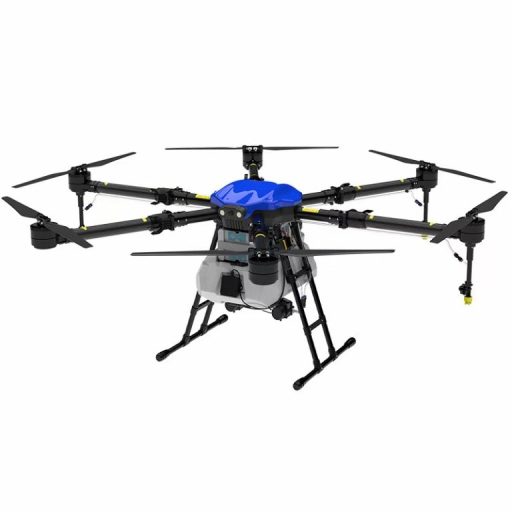uav spraying is a new operation mode in the development of science and technology. High efficiency, suitable for large area of agricultural pest control. This is tens or hundreds of times more than manual labor. It can accomplish tasks that can be easily done manually, such as forest and mountain forest operations. So how effective is the use of medical drones in rural land?av spraying is a new operation mode in the development of science and technology. High efficiency, suitable for large area of agricultural pest control. This is tens or hundreds of times more than manual labor. It can accomplish tasks that can be easily done manually, such as forest and mountain forest operations. So how effective is the use of medical drones in rural land?
There are always two sides to a story, namely advantages and disadvantages. Drone spraying is no exception, with pros and cons. The advantage is the speed of spraying. Plant protection UAVs used for agricultural spraying are generally multi-rotor aircraft, which are much larger, longer-lasting, and faster than the average small aerial photography drone, not to mention hundreds of times more efficient than manual spraying.
In addition, the plant protection UAV can adopt two control modes: manual remote control and satellite guidance control. Usually, large plots use satellite navigation to control spraying. For plots, seamless spraying can be achieved without loss of crops. No matter how slow and careful the manual spraying, there will be omissions at the beginning, which is incomparable to the machine
Spray drone use
The spray quality is also very high. The principle of drone spraying is to install the medicine box on the fuselage, open the valve to expel the medicine after the drone takes off, and then use the powerful wind generated by the high-speed rotation of the drone blade to atomize the medicine and blow it over. Spraying the drug in this way is more effective than manual spraying because the drug is atomized and blown off violently by the wind, so the rate of adhesion and diffusion of the drug is higher than that of traditional manual spraying.
In fact, there are many potential safety hazards hidden in drones, some of which have been documented in previous reports. For example, in the process of spraying pesticides, because the pesticides are not sprayed into the river, all the living things in the river will be poisoned. A clear horizon river is easy to destroy. If there are farmed aquatic products in the river, such problems can easily become economic disputes.
Spray drone factory
In addition, the publicity of UAV pesticide spraying in modern rural areas is not enough, and there are many regulatory loopholes. Relevant departments need to introduce policies for correct guidance and management to avoid irreparable losses caused by technical errors and ensure the safety of UAV pesticide spraying.
Therefore, if want to spray pesticides drone, rural areas must first provide the corresponding technical support, and provides the unmanned aerial vehicle (uav) training for farmers, to ensure that they use drones in the right circumstances, so as to avoid many problems As long as they have enough skill, they must be consistent in the spraying process.
In addition, the effect of uniform application is poor due to its high speed. The UAV spray passes instantly, difficult to mix evenly and thoroughly. In order to overcome the problem of uneven and thorough beating, the only way is to increase the concentration of liquid medicine, thus increasing the investment cost. For example, when spraying a cotton field with a drug, the drone spray simply does not kill the bollworm in the cotton bud, the aphid on the back and bottom of the leaf.
Endophytic pests can only be dealt with by absorbing crops, and even some pests are not killed by endophytes, but only by contact. The main disadvantage of manual spraying is that it is slow and difficult to apply at high altitudes. It has the advantage of being applied evenly, hitting the crop up and down evenly and thoroughly. Save the technical solution.
Although the use of drones for pesticide spraying has many advantages, such as high efficiency and good quality, it also has certain limitations. For example, it depends on weather conditions. It can’t take off in bad weather or work all day. It is only suitable for large areas in the north, while mountainous and hilly areas in the south are not particularly suitable for large-scale operations.
In general, using drones to spray pesticides on farmland is very cost-effective. Short time, uniform spraying, inexpensive. As a result, more and more farmers are slowly choosing to use drones to spray pesticides on their crops. There are also many bright young people who see a bright future in the industry and specialize in drone painting, and the benefits are still substantial.
Unmanned aerial vehicle (UAV) is the embodiment of the application of high-tech technology in agriculture. It is the progressive product of the combination of modern science and technology and traditional agriculture. From an efficiency point of view, it is indeed higher than manual spraying. From a practical point of view, it can’t compare to doing it manually. The drones can only spray on the front of the crop, but not on the back.
When spraying pesticides, unmanned aerial vehicles also pay attention to the weather. Due to high wind and fog, it is impossible to operate, which can be completely ignored by manual operation. Therefore, unmanned operation has its own advantages, manual operation also has its advantages, should be complementary. We can’t veto drones with one vote. We should look at new things from the perspective of development. Despite its drawbacks, drone operations are an aid to the future of agriculture.







Please sign in to comment
register